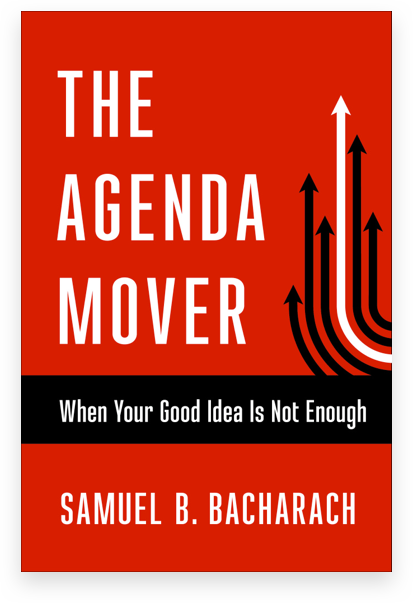Forget Charisma – You Need to Master Your ‘Microskills’

When we picture leaders – the real movers and shakers of the world, whether they be political figures, lauded innovators, or even a great teacher you had in school – we tend to think of them as larger-than-life personages whose charisma and sheer brilliance allowed them to make massive strides in their fields.
But according to Samuel Bacharach, cofounder and director of program development at the SoHo-based leadership consultancy Bacharach Leadership Group (BLG), that’s all bunk.
“You can have all the talent in the world, all the charisma, whatever – it won’t do you any good if you can’t actually move your agenda forward,” Bacharach says. “All the good ideas you have – unless you have some of the fundamental micropolitical competencies you need to move the agenda, it doesn’t matter.”
Bacharach’s not just preaching to the next Steve Jobs or Martin Luther King, Jr., of the world. No matter who you are or what you do, you have an agenda to move if you want to be successful. Job seekers’ need jobs – that’s an agenda. Recruiters need talent – yes, that’s an agenda. No one is exempt from Bacharach’s mandate to learn “micropolitical competencies – or “microskills,” as they are called in BLG’s new book, The Agenda Mover: When Your Good Idea Is Not Enough.
As the title suggests, The Agenda Mover is an in-depth look at how to turn an idea into reality by taking a series of specific actions to mobilize support, get buy-in, and sustain the agenda’s success. These actions are not grounded in charisma or other such near-supernatural inherent traits. Rather, these are small skills that anyone can learn how to do.
As Bacharach puts it, “[The book] tells you how to get stuff done in spite of who you are, not because of who you are.”
The Charisma Problem
While pop culture tends to celebrate charismatic individuals, Bacharach finds charisma to be a discriminatory and limiting notion, one that forecloses success for the vast majority of people.
“You can’t simply rely on your charm. If you rely on your charm, most of us will not be allowed to play,” Bacharach says. “Most of us are not going to be given a chance. We’ll be dismissed because of how we look, how we speak. The whole idea of charisma — it means a lot of people are being excluded from the game.”

“Our notion of ‘charismatic’ is very much dictated by what we see in the movies,” Bacharach says. “[It’s dictated by] who gives the grandiose speech, how people dress, how they come off, who is cool, and who is not cool.”
Furthermore, our cultural focus on charisma means we often fail to accurately assess how revered leaders actually arrived at their major successes. For example, Steve Jobs is regularly portrayed as a visionary genius, but that’s hardly the full story of his ascent. As The Agenda Mover points out, “Jobs was successful because he was proactive and pragmatic in pushing his ideas. His charisma shaped who he was but was not essential to his program.”
Bacharach also says that charisma is problematic because it is very gender-specific. We tend to only think of male figures as being charismatic.
“If you ask your readers to name five charismatic people, they’re probably going to name four or five males – and they’re going to name people who aren’t anything like most of us,” Bacharach says.
Eager to disabuse us of our cultural notions regarding the centrality of charisma, Bacharach says “the time has come to say to people that leadership is about the capacity to get something done — and getting something done can be done by people who have no charisma. They just need the capacity to build on their ideas and move their agendas.”
To Move Your Agenda, Become Politically Competent
According to Bacharach, one can acquire the capacity to move their agenda by learning how to be “politically competent,” and political competence is about acquiring certain microskills that aid in pursuing an agenda.
In contrast to “core skills” – the raw technical skills that many of us acquire through training, education, and job experience – microskills are more oriented toward engaging with people in productive ways. The Agenda Mover covers an array of specific actions and techniques one should adopt in moving their agenda forward, but microskills in general largely fall into four major categories:
- Anticipating the agendas of others
- Mobilizing your campaign
- Negotiating support
- Sustaining your campaign
These microskills are not as difficult to acquire as they may seem. For example, anticipating the agendas of others may sound like a daunting task – how can you possibly anticipate all possible objections to your own agenda? – but Bacharach argues that, in fact, there are a limited number of ways in which people can challenge you.
“We’re so obsessed by our own ideas, but we should really be anticipating what someone else is going to say,” Bacharach explains. “There are minimal things people can challenge you on. It’s about doing your homework on those things.”
From anticipation to sustaining, the microskills one needs to be politically competent are “all things we can methodically do,” Bacharach says.
–
“I used to think everyone knew all this,” Bacharach says. “I used to think, ‘Oh my God – this is stuff I learned on a playground in Brooklyn.'”
But through his years of working with organizations, students, universities, and individual professionals, Bacharach has realized that isn’t the case.
“I think we spend an awful lot of time giving people raw abilities and core skills, but we don’t spend enough time giving them these microskills,” he says.
In today’s business world, where solid hierarchies have been supplanted by team- and project-based work, the ability to move an agenda has become more critical than ever for all of us, no matter our industry or station in life.
“It’s not enough to simply have concrete ideas,” Bacharach says. “The people who achieve are the ones who have raw abilities and raw knowledge, but also have this talent to really move agendas. You have to know how to really pitch your ideas and anticipate what people have to say.”
Otherwise, “we leave it all to the charismatic ones, and the rest of us are excluded.”

